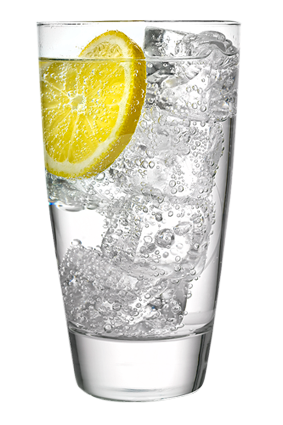The Right Way to Drink Lemon Water
(For Maximum Benefits),
According to a Nutritionist
Along with soothing a sore throat, aiding in digestion, and flushing out toxins, drinking
lemon water yields a number of health benefits . . . right?
To find out whether adding a few slices is actually doing your body any good, we consulted Autumn Bates, a certified clinical nutritionist and personal trainer. Spoiler: the perks of lemon water are not a myth, but there are best practices when it comes to getting the most out of each squeeze.
How much lemon should you be using for results?
According to Bates, you can still reap the benefits of lemon water as long as you incorporate the whole lemon, including the peel. One study published in the Journal of Clinical Biochemistry and Nutrition showed that certain polyphenols found in a lemon peel aided weight loss in rats with a high-fat diet. In addition to potentially helping you shed pounds, the fruit is packed with vitamin C. “One lemon contains a high amount of vitamin C that is needed to produce collagen in your body, boost your immune system, and regenerate glutathione (your body’s powerful antioxidant used in daily detoxification),” Bates told POPSUGAR.
Bates recommends adding at least half a lemon (sliced) to eight to 10 ounces of water.
Is it best to add lemon to cold,
warm, or hot water?
Warm water all the way. This temperature helps extract vitamin C and polyphenols from both the lemon and its peel. According to Bates, although vitamin C isn’t heat stable – meaning it can degrade once it reaches a certain temperature – even a boiling temperature isn’t hot enough to negate the fruit’s benefits. However, warm water is ideal as its easier to drink in large quantities, while hot liquids have been linked to cancer by the World Health Organization.
What’s the best time of day to drink lemon water?
Our body is extremely dehydrated by the time we wake up, so Bates says to grab a glass first thing in the morning. “While we sleep, we lose a lot of water through breathing,” she said. “Hydrating with a warm glass of lemon water is best right when you wake up to help replenish what was lost overnight and start your day off on the right foot.”
In addition to adding flavor to your water (and helping up your intake as a result), lemon can boost your immune system and form collagen in your body (which promotes skin and joint health), thanks to its high levels of vitamin C. But be warned: you may also be running the risk of thinning out your teeth’s enamel by drinking lemon water all day, every day. Bates also shared that those with high levels of iron in their blood should limit their intake, as lemon can increase your body’s ability to absorb iron.

Facts about Drinking Lemon Water
Does lemon water detox your body?
Because lemon water increases urine production, it will offer certain detox benefits. Remember to drink warm lemon water in the morning for the most effect.How to make honey lemon water?
Add 1 tbsp honey and stir in warm lemon water until dissolved.Can drinking too much lemon water make you sick?
Too much of anything is not good. Everything in moderation.Does lemon make water alkaline?
Lemon is an alkaline food. It is acidic on its own but inside your body it becomes alkaline.Does it make you pee?
Lemon water is a natural diuretic. It makes you pee and keep the bloat off. Excess of citric acid in lemon will increase urine production. And don’t forget you are consuming more water overall.How to make lemon water with bottled lemon juice?
Bottled lemon juice contains sulphites (preservative) and tastes weird. I would not recommend to use bottled lemon juice. It offers no health benefits compared to fresh lemon juice.Does lemon water make your teeth yellow?
Undiluted lemon juice or highly concentrated lemon drink is acidic enough to wear off enamel from your teeth. Whatever you do, do not brush your teeth right after drinking lemon water. Wait at least 30 minutes or brush 30 minutes before.How to make lemon ginger water?
Add 1 tsp or more to taste of chopped fresh ginger to a cup with warm lemon water. Steep for about 2 minutes.Does it make you poop?
Sorry but have to cover this popular question. Lemon water helps to soften stools and make them pass easier. Drinking warm lemon water in the morning can help with constipation issues.Does lemon water make you lose weight?
Lemon juice itself doesn’t have fat burning properties. Despite popular belief even warm lemon water will not speed up your metabolism. But it can help with weight loss if you are drinking lemon water instead of pop or juice. Otherwise, lemon water doesn’t make you lose weight on its own.Lemon Water is all the rage these days.
1. It promotes hydration
According to the Food and Nutrition Board, general guidelines say that women should get at least 91 ounces per day and men should get at least 125 ounces. This includes water from food and drinks.
Water is the best beverage for hydration, but some people don’t like the taste of it on its own. Adding lemon enhances water’s flavor, which may help you drink more.
4. It improves your skin quality
Vitamin C found in lemons may help reduce skin wrinkling, dry skin from aging, and damage from the sun. How water improves skin is controversial, but one thing is certain. If your skin loses moisture, it becomes dry and prone to wrinkles. A 2016 laboratory study showed that a citrus-based drink helped prevent the development of wrinkles in hairless mice.
7. It helps prevent kidney stones
The citric acid in lemons may help prevent kidney stones. Citrate, a component of citric acid, paradoxically makes urine less acidic and may even break up small stones. Drinking lemon water not only gets you citrate, but also the water you need to help prevent or flush out stones.
2. It’s a good source of vitamin C
Citrus fruits like lemons are high in vitamin C, a primary antioxidant that helps protect cells from damaging free radicals. You’ve probably heard that vitamin C may help prevent or limit the duration of the common cold in some people, but studies are conflicting.
Vitamin C may reduce your risk of cardiovascular disease and stroke, and lower blood pressure.
While lemons don’t top the list of citrus fruits high in vitamin C, they’re still a good source. According to the United States Department of Agriculture, the juice of one lemon provides about 18.6 milligrams of vitamin C. The recommended daily amount for adults is 65 to 90 milligrams.
5. It aids digestion
Some people drink lemon water as a daily morning laxative to help prevent constipation. Drinking warm or hot lemon water when you wake up may help get your digestive system moving.
Ayurvedic medicine says the sour lemon taste helps stimulate your “agni.” In ayurvedic medicine, a strong agni jump-starts the digestive system, allowing you to digest food more easily and helping to prevent the buildup of toxins.
3. It supports weight loss
Research has shown that polyphenol antioxidants found in lemons significantly reduces weight gain in mice that are overfed in order to induce obesity.
In these mice studies, the antioxidant compounds also offset the negative effects on blood glucose levels and improved insulin resistance, the two main factors in the development of type 2 diabetes.
While the same results need to be proven in humans, anecdotal evidence is strong that lemon water supports weight loss. Whether this is due to people simply drinking more water and feeling full or the lemon juice itself is unclear.
6. It freshens breath
Have you ever rubbed a lemon on your hands to get rid of the smell of garlic or some other strong odor? The same folk remedy may apply to bad breath caused by eating foods with strong smells such as garlic, onions, or fish.
You might avoid bad breath by drinking a glass of lemon water after meals and first thing in the morning. Lemon is thought to stimulate saliva and water also helps prevent a dry mouth, which can lead to bad breath caused by bacteria.
In order to reap any health benefits of lemon water, you need drink it consistently, and you need more than just a single wedge of lemon in your mug.
When making lemon water, always use fresh lemons rather than artificial lemon from a bottle.
To make lemon water, squeeze half a lemon into 8 ounces of warm or cold water. To make the drink as healthy as possible, use filtered water and organic lemons.
Infuse more flavor or add a health boost to lemon water by adding:
• a few springs of mint
• a teaspoon of maple syrup or raw honey
• a slice of fresh ginger
• a dash of cinnamon
• a sprinkle of turmeric
You can also add slices of other fresh citrus fruits such as limes and oranges, or cucumber slices. Always wash the produce well before slicing and using.
Having lemon ice cubes on hand is a great way to add lemon to your water fast. Simply squeeze fresh lemon juice into ice cube trays and freeze. Drop a few cubes into a glass of cold or hot water as needed.
You can start your morning with a mug of warm lemon water, and keep a pitcher of water infused with a few sliced lemons in your refrigerator to drink throughout the day.
Side effects of lemon water
Lemon water is generally safe to drink, but there are a few potential side effects to be aware of.
Lemon contains citric acid, which may erode tooth enamel. To limit the risk, drink lemon water through a straw, and rinse your mouth with plain water afterwards.
When it comes to heartburn, lemon water can go either way. The citric acid may cause heartburn in some people. Others experience relief from heartburn, as lemon juice becomes alkaline, reducing acidity in digestion. Only experimenting can tell its effect on you.
Some people report more frequent trips to the bathroom when drinking lemon water. Although vitamin C is often believed to be a diuretic, something that increases the amount of urine you produce, evidence doesn’t show that vitamin C from natural sources like lemons has diuretic effects.
If you experience the need for extra bathroom breaks while drinking lemon water, it’s more than likely caused by increased water intake.




